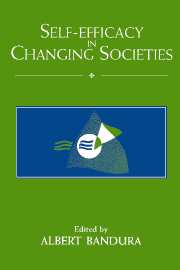Book contents
- Frontmatter
- Contents
- Foreword
- Preface
- List of contributors
- 1 Exercise of personal and collective efficacy in changing societies
- 2 Life trajectories in changing societies
- 3 Developmental analysis of control beliefs
- 4 Impact of family processes on control beliefs
- 5 Cross-cultural perspectives on self-efficacy
- 6 Self-efficacy in stressful life transitions
- 7 Self-efficacy and educational development
- 8 Self-efficacy in career choice and development
- 9 Changing risk behaviors and adopting health behaviors: The role of self-efficacy beliefs
- 10 Self-efficacy and addictive behavior
- Name Index
- Subject Index
5 - Cross-cultural perspectives on self-efficacy
Published online by Cambridge University Press: 04 August 2010
- Frontmatter
- Contents
- Foreword
- Preface
- List of contributors
- 1 Exercise of personal and collective efficacy in changing societies
- 2 Life trajectories in changing societies
- 3 Developmental analysis of control beliefs
- 4 Impact of family processes on control beliefs
- 5 Cross-cultural perspectives on self-efficacy
- 6 Self-efficacy in stressful life transitions
- 7 Self-efficacy and educational development
- 8 Self-efficacy in career choice and development
- 9 Changing risk behaviors and adopting health behaviors: The role of self-efficacy beliefs
- 10 Self-efficacy and addictive behavior
- Name Index
- Subject Index
Summary
The present chapter addresses three major issues. First, we analyze how culture might affect the various sources of self-efficacy belief systems. For this purpose, the dimensions of cultural diversity specified by Hofstede (1980, 1991; see also Triandis, 1989) and their impact on the sources of self-efficacy information in family and school contexts are examined. Second, we compare children's self-efficacy beliefs in East and West Berlin, Moscow, and Los Angeles based on data from an ongoing research project coordinated by G. Oettingen, T. D. Little, and P. B. Baltes. The results demonstrate cross-cultural variations in efficacy beliefs that are congruent with differences in efficacy-relevant influences hypothesized to be operating in each culture's school contexts. Third, we discuss the critical question of whether self-efficacy effects on cognition, affect, and motivation are universal across cultures. We speculate on the type of research that would be needed to demonstrate universality, which raises issues of individual versus collective efficacy.
Culture and the sources of self-efficacy information
Bandura (1977, in press) specifies four information sources that people use in forming their sense of personal efficacy. The most important source is performance experiences. Successes build a sense of self-efficacy; failures weaken it. Repeated early failures especially may have the most adverse effect if they cannot be discounted as due to lack of effort or unfavorable circumstances. Failures are less detrimental if people have already developed a strong sense of self-efficacy through early frequent successes.
- Type
- Chapter
- Information
- Self-Efficacy in Changing Societies , pp. 149 - 176Publisher: Cambridge University PressPrint publication year: 1995
- 116
- Cited by

